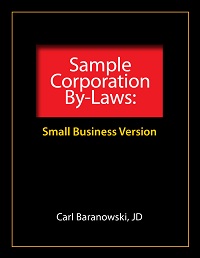 As you may already know, the process of incorporating a business isn’t all that difficult. In many cases, you simply file a fill-in-the-blanks incorporation form or a one-page “Articles of Incorporation” document with the appropriate state agency (often the secretary of state).
As you may already know, the process of incorporating a business isn’t all that difficult. In many cases, you simply file a fill-in-the-blanks incorporation form or a one-page “Articles of Incorporation” document with the appropriate state agency (often the secretary of state).
Even experienced entrepreneurs and investors, however, often have trouble coming up with appropriate corporate by-laws (also called “bylaws”) on their own. And while you might be tempted to skip drafting corporate by-laws, you shouldn’t skip this important step.
Many attorneys will tell clients that having and following corporate by-laws increases legal liability protection because the by-laws further enforce and underscore the separate legal identity of the small corporation. Also, in many cases, outside parties like your bank will require you to provide a copy of your by-laws before they’ll do business with you.
If you have a corporation but still need to draft its by-laws, you may wish to purchase our e-book, Sample Corporation By-Laws, for just $19.
Purchase and Download
Click the button below to add Sample Corporation By-Laws to your cart:
What’s Inside
This document is a nine-page, rich-text-format file created in Microsoft Word. The short document shows you what corporate by-laws look like. And you can even use this document as a template for constructing your own personalized by-laws for your small business. Simply fill in the blanks and then make whatever other changes you want or your attorney recommends.
About the Attorney Who Drafted Sample Corporation By-Laws
The sample corporate by-laws available here were written by St. Petersburg Florida business lawyer Carl Baranowski. An attorney for more than twenty years, Carl has worked both as an in-house corporate counsel and as practicing attorney, serving both private and public real estate and high technology companies. Baranowski holds an MBA from Stanford University’s Graduate Business School and JD from Stanford University’s Law School. He also earned two master’s degrees and a bachelor’s degree from the Massachusetts Institute of Technology. A member of both the Florida Bar and the Texas Bar as well as a past member of several other state bar associations, he also co-authored the popular legal reference, Representing High-Tech Companies (Law Journal Press, 2006).